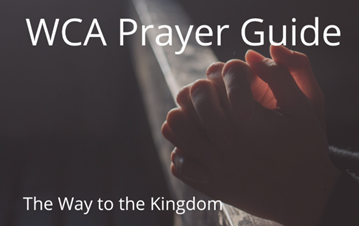
| By David F. Watson |
| The way to glory is the way of the cross. “Let the same mind be in you that was in Christ Jesus,” Paul writes (Phil 2:5). The mind of Christ is the pattern for the Christian life. Paul then tells us what this pattern entails in the kenosis (emptying) hymn of Philippians 2:6‑11:
[T]hough he was in the form of God, [Christ] did not regard equality with God as something to be exploited, but emptied himself, taking the form of a slave, being born in human likeness. And being found in human form, he humbled himself and became obedient to the point of death— even death on a cross. Therefore God also highly exalted him and gave him the name that is above every name, so that at the name of Jesus every knee should bend, in heaven and on earth and under the earth, and every tongue should confess that Jesus Christ is Lord, to the glory of God the Father. There is a deliberate parallelism in the hymn: Christ had the form of God, but he took the form of a slave. His obedience to God was not coerced. He emptied himself. He humbled himself, and therefore God highly exalted him. Obedience to God is no easy task. “[T]he gate is narrow and the road is hard that leads to life, and there are few who find it” (Matt 7:14). We have to confront our own egos, our self-will, our need for control. It is a blessing to submit to the will of God, but it is also painful. God purifies us like gold in a refiner’s fire. Through the Holy Spirit, we crucify the flesh (Gal 5:24) and are conformed to the image of the Son (Rom 8:29). And when this happens, we realize that we are strangers and aliens (1 Pet 2:11). This world is not our true home. Our true King, Jesus Christ, sends us out as his ambassadors (2 Cor 5:20) to carry the Gospel into life’s painful places, sometimes at great cost. The Gospel calls us into confrontation with sin, death, and all of their manifestations in the world. Despite the many peddlers of faith that look more like consumerism than Christianity, there is no true Christian faith without pain. When we confront that pain with the love and power of Christ, there can be healing. That is the way to glory–not the counterfeit glory of this world, but the true glory that comes through faith in Jesus Christ.
A Suggested Pattern of Prayer As you pray through the following prayer points, invite the presence of the Lord into your time of prayer. Each day’s prompt has a Scripture reference for you to pray through. As you pray allow time to also listen to what the Holy Spirit is saying to you. When you have prayed through the Scripture and prayer point, you may be led to add your own prayers. Pray and consider what action steps you might take in response to the Lord’s leading. Repeat this prayer pattern weekly for the month. Prayer points: Sunday: Praise God for his goodness and love. Offer him praise and thanksgiving for coming to us in Jesus Christ, who emptied himself and was obedient, even to the point of death upon the cross. (1 Cor. 15:57) Monday: Pray that every clergyperson in the Global Methodist Church will receive the mind of Christ. (1 Cor. 2:14-16) Tuesday: Pray that every layperson in the Global Methodist Church will receive the mind of Christ. (1 Cor. 1:10) Wednesday: Ask God to pour out a spirit of obedience on the Global Methodist Church. (1 Pet. 1:22) Thursday: Ask God to teach us what it means to crucify the flesh, and to give us the will and wisdom to do it. (Gal. 5:24) Friday: Pray that God will give us the strength to confront the powers of sin and death in this world, and to walk into painful circumstances and bring the healing love of Christ. (Eph 6:10-13) Saturday: Praise God for the salvation we have in Christ, and for the glory we glimpse in the present but will know fully in the age to come. (2 Cor 3:18) “Let the same mind be in you that was in Christ Jesus.” (Philippians 2:5) The Rev. Dr. David Watson serves as Academic Dean and Professor of New Testament at United Theological Seminary in Dayton, Ohio. He is also the Lead Editor of Firebrand, an online magazine aimed at enlivening intellectual dialogue in various related traditions, including Methodist, Arminian, Holiness, Pentecostal, and others.
|

